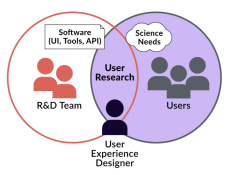STRUDEL to Hold Hands-on Hackathon at Berkeley Lab on March 19
Goal is to Introduce Users to Unique IX/IT Tool for Scientific Software Design
March 4, 2024
Contact: cscomms@lbl.gov
“STRUDEL” (Scientific sofTware Research for User experience, Design, Engagement and Learning), an emerging open-source science project at Lawrence Berkeley National Laboratory (Berkeley Lab), is hosting a webinar and a hackathon in March to introduce software teams to a new user experience/user interface (UX/UI) design tool that addresses the challenges of creating usable scientific software and puts user engagement at the forefront.
User experience is often an afterthought in scientific software, which can impact product usability, accessibility, design, and functionality. But the UX community for scientific software is growing and has begun addressing these challenges with new tools such as the STRUDEL Design System, which provides a set of reusable components and patterns to enable teams to create user-centered software for science applications and plan, design, and build better scientific software for scientific workflows and data. STRUDEL builds on the development team’s experiences incorporating UX in many scientific projects.
“The Design System was designed from the beginning with scientific software in mind,” said Sarah Poon, a UX designer and researcher in the Scientific Data Division’s Usable Data Systems group and a member of the STRUDEL development team. “It is different from the things you would find in commercial software, like a checkout page or a social media page. While some of those features might apply here, from the start we have focused on how this design tool applies specifically to scientific software.”
STRUDEL is the brainchild of the Berkeley Lab Scientific Data Division’s User Experience team, with funding from the Arthur P. Sloan Foundation and support from the Berkeley Lab Foundation. The collaboration formally introduced the Design System and the concepts behind it on Feb. 21 at the team’s first webinar, “The Journey to STRUDEL: How We Came to Embrace User Experience in Scientific Ecosystems” (this link includes video and slides from the event).
A second instructional webinar, “How to Build a Science UI: Getting Started with the STRUDEL Design System,” will take place on March 8, 11 a.m.–12 p.m. Pacific time; for more information and to register, go to https://go.lbl.gov/strudel-get-started-webinar.
Also in March, STRUDEL is hosting an all-day, in person hackathon at Berkeley Lab, where participants will have the opportunity to prototype a new UI using the Design System while receiving expert support from the STRUDEL team. This event will take place on March 19; space is limited, so interested attendees are urged to register by March 11 at https://go.lbl.gov/strudel-hackathon-signup.
The STRUDEL team is actively seeking users from across the science community to “test drive” this first version of the Design System and provide feedback that will enhance its performance, utility, and usability going forward.
“We are eager to have scientists who are building software for their work who need help with their user interfaces try this out and give us feedback,” said Drew Paine, UX researcher in the Scientific Data Division’s Usable Data Systems group and a member of the STRUDEL development team. User experience work takes an iterative approach to research and design, repeatedly engaging with users about their needs and the usability and usefulness of designs being developed, he added. “We are at the stage where we need their expertise and experiences” as the project continues to conduct research and design on its products and makes plans for future directions.
About Berkeley Lab
Founded in 1931 on the belief that the biggest scientific challenges are best addressed by teams, Lawrence Berkeley National Laboratory and its scientists have been recognized with 16 Nobel Prizes. Today, Berkeley Lab researchers develop sustainable energy and environmental solutions, create useful new materials, advance the frontiers of computing, and probe the mysteries of life, matter, and the universe. Scientists from around the world rely on the Lab’s facilities for their own discovery science. Berkeley Lab is a multiprogram national laboratory, managed by the University of California for the U.S. Department of Energy’s Office of Science.
DOE’s Office of Science is the single largest supporter of basic research in the physical sciences in the United States, and is working to address some of the most pressing challenges of our time. For more information, please visit energy.gov/science.










